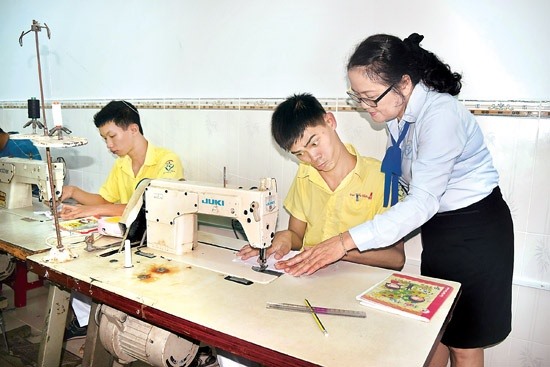 Society
Society

Physically challenged women face a lot of obstacles while looking for jobs, from companies and from other women too, said experts at a discussion held in Hà Nội today.
 |
| Disabled people receive vocational training at a centre in Hà Nội. They meet a lot of difficulties in finding jobs. – Photo healthplus.vn |
HÀ NỘI — Physically challenged women face a lot of obstacles while looking for jobs, from companies and from other women too, said experts at a discussion held in Hà Nội today.
The workshop, titled Jobs for People with Disability in Enterprises, was held by non-governmental organisation Inclusive Development Action (IDEA), which works with people with disabilities, and Kenan Institute Asia. It is part of Kenan’s Việt Nam Women Improving Lives and Leadership (Vietnam WILL) Project, which has been running from October 2014 and will continue till March 2017.
Nguyễn Thị Thu Hoài, an expert from Việt Nam Women Academy, said that at present not more than one third of women with disabilities in the country had jobs. Most of them had simple jobs and very few receive vocational training, she said.
A large percentage of differently abled women - more than 60 per cent - work at home, and the remaining work in associations connected with disabled people, and private and state enterprises, the latest research done by the Academy reveals.
One in four physically challenged women worked in poor conditions that affect their physical and psychological health, Hoài said.
Nguyễn Hồng Oanh, director of IDEA, said it was difficult for women with disabilities to find jobs because of social discrimination, shortage of equipment for rehabilitation and hurdles in commuting.
Many enterprises didn’t have the right awareness or assessment of the abilities of physically challenged people, Đinh Thị Quỳnh Nga, director of Trái Tim Hồng (Pink Heart) Co-operative, a co-operative whose 80 per cent employees are differently abled women, said. “Once they get a job, they are very hard-working and patient in their work.”
Enterprises discriminate, often focusing on a person’s disability and finding excuses to refuse them jobs, said Nga, who is disabled herself and was unemployed for seven years till she decided to set up an enterprise to create work for people in her situation.
Experts shared the opinion that the state should institute stronger policies for employing physically challenged people. It should punish businesses that refuse to hire disabled people, Hoài said.
The procedure to borrow capital with interest from social banks should also be simplified, Hoài said. At present, the process is complicated whereas the amount of capital they can borrow is not much.
Nga suggested that there should be more vocational training schools for people with physical disabilities and that enterprises must improve infrastructure so that physically challenged people can do more diversified work. — VNS




